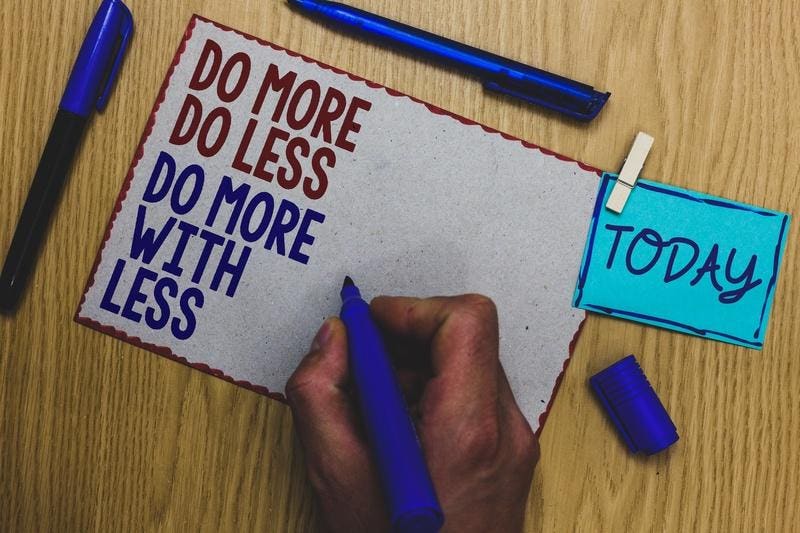By Dianna Booher—
“How do you find time to write?” remains one of the most frequent questions book-coaching clients ask me. They typically go on to elaborate, “I feel like I have a several books inside me, but I just can’t find the time to sit down and write.” They may be right. Granted, some authors struggle with the time commitment required to write a full-length, quality book.
But productivity can be a pitfall for almost any professional in any industry—not just writers. So I’m outlining here some productivity tips that I pass along to author clients as well as family and friends who find too many tasks on their to-do list at the end of the week.
Develop Routines to Reduce Decision-Making
The legendary co-founder of Apple, Steve Jobs, took this principle to heart with his decision to wear a black shirt and pants every single day. Although he picked up the idea in Japan that “uniforms” build community and unity, no doubt that he quickly found other advantages—like not wasting brain power in selecting a different outfit every day.
Many successful people have discovered that same advantage in dressing the same way every day—for example, my friend and colleague Marshall Goldsmith, who always wears green shirts and khaki pants.
Likewise, with other “routine” decisions. Do you and a family member or a friend ever have this discussion:
“Where do you want to go for dinner?”
“I don’t know. . . . Where do you want to go?”
“Doesn’t matter. What kind of food are you in the mood for?”
“I don’t know. . . . Anything. . . . You decide.”
We’re decision-weary. Eliminate all the small decisions in life so you can focus on the important ones.
Organize Your Tasks and Your Space So You Can Find Things Quickly
That includes your closets, drawers, desks, tools, supplies, files, emails, music—everything. If you can’t figure out how to organize and simplify your life, hire a productivity consultant to come in and set things up for you. You’ll love the results.
In fact, you may become so enamored with the productive life that you become quite vocal about the new habits—just as enthusiastic as those stop-smoking evangelists, who tell anyone who’ll listen how they kicked that bad habit.
Keep an Inventory
If you’re a parent, you know the panic that hits when your grade-schooler tells you at 9:00 p.m. that he needs a gift for a birthday party the next day. Just as your workplace has a “supply room” on the premises for you to replenish the binder clips in your desk drawer, keep an appropriate stock of staples (tissues, toilet paper, napkins, deodorant, soap, toothpaste, paper towels) so you’re not having to interrupt your day to shop in person or online.
That goes for work and home. We have more than 30 rolls of paper towels in the kitchen pantry. The bedroom closet holds a choice of gifts that I might need spur of the moments: candles, decorative towels, games. Because I often travel as a keynoter and also change hairdos often, I keep several curling irons in multiple sizes in case one goes on the blink. (I just counted 9 on my closet shelf.)
Having to make a quick run to the grocery store, the office supply shop, or your favorite department store for a single item is inefficient—and frustrating if you’re in the middle of a big project.
Be Wary of Time-Saving Technology—That Doesn’t
I’m definitely dependent on technology, and wouldn’t want to live without some of it. But despite what you hear or read, technology—no matter the hype—doesn’t always save you time.
You can’t read a blog or listen to a podcast without finding comments on AI and how its use saves time. Granted, AI can spit out an article, recipe, or talking points for your next presentation in nanoseconds. In fact, my inbox fills every day with email offers about some innovative software that can schedule meetings faster, calculate all kinds of metrics, improve my voice quality, or generate sales leads.
But sometimes, low-tech can be even faster. For example, my husband and I host a 42 party monthly at our home, and we typically have 25-35 regular guests. So “to save time,” I meticulously listed all the names alphabetically on a spreadsheet, with the idea that as they all RSVP’d by email, phone, or text during the 7-10 days before the party, I’d check off their names on my spreadsheet. Then after I’d heard from all, I could print out the list and have it handy to prepare—tables, drinks, snacks. But I soon found it time-consuming to sit down to the PC, open the file, and click “Yes” by each of 32 names. (After all, I don’t sit by my PC 24X7.) So I discovered that jotting their name on a paper list was easier and faster.
Yes, that’s a simple illustration of low-tech versus high-tech. But before you spend big dollars on gadgets and gizmos to make your life easier, consider all that’s involved—shopping, purchase, insurance, learning curve, security, and so forth before deciding what’s the quickest, easiest way to accomplish your goal.
Whether writing and publishing a book, drafting a legal brief, or building a bridge, your productivity paves the way to long-term success.
Dianna Booher is the bestselling author of 50 books, including Communicate Like a Leader. She helps organizations communicate clearly and individuals increase influence with a strong personal presence.
Read the full article here










